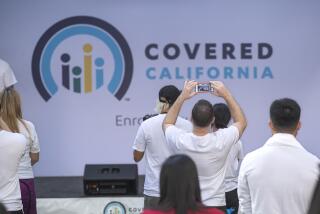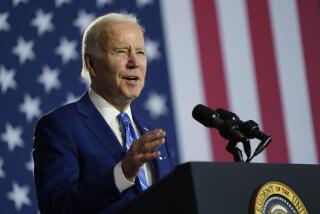Full steam ahead for Obama healthcare law
WASHINGTON — Three and a half years after President Obama signed his landmark healthcare law, his administration made its final preparations Monday to begin enrolling millions of Americans in health insurance amid persistent anxiety over possible technical problems and intense opposition from Republican critics.
Administration officials emphasized that a government shutdown would not prevent the federal website for enrolling in health coverage — https://www.healthcare.gov — from going live at 8 a.m Eastern time Tuesday, allowing consumers to begin signing up for plans.
Officials in most states that are running their own online insurance marketplaces — including California, Connecticut and Maryland — are also planning to open for business Tuesday. And call centers set up to handle consumer questions through the government’s 1-800-318-2596 hotline are scheduled to be open for business.
PHOTOS: What shuts down in federal government
“The Affordable Care Act is moving forward,” Obama told reporters at the White House on Monday. “You can’t shut it down.”
The law, commonly known as Obamacare, is designed to allow Americans who don’t get coverage through employers to shop for health plans through new state-based online insurance marketplaces.
Insurers for the first time must meet new basic standards and are prohibited from turning away consumers with preexisting medical conditions. Millions of low- and moderate-income Americans who make less than four times the federal poverty level — or about $46,000 — will qualify for government subsidies to help with their premiums.
Creating the insurance marketplaces has been extremely difficult, and Health and Human Services Secretary Kathleen Sebelius emphasized Monday that some glitches were likely. “We know that there are opponents who are desperate for anything that could possibly go wrong,” she said.
But Sebelius noted that even the rollout of Apple’s latest operating system was not without problems. “No one is calling on Apple to not sell devices for a year or get out of the business because the whole thing is a failure,” she said. “Everyone just assumes, ‘Well, there’s a problem, they’ll fix it and we’ll move on.’ … We’re likely to have some glitches. We will fix them and move on.”
The Obama administration has already delayed two online tools that were supposed to go live Tuesday.
Small businesses that wish to enroll their employees in health coverage through the new online websites will have to wait until November, although they will still be able to enroll employees using paper forms in October.
And Spanish-speaking Americans who want to sign up for health coverage will have to use an English-language enrollment system until Oct. 21, when the Spanish-language version is now scheduled to go online.
Similar technical glitches have also delayed online marketplaces in several states that are running their own systems, including Colorado, Maryland and Oregon.
Equally challenging for the Obama administration is explaining a law that remains a mystery to many Americans, particularly those who lack health insurance and who will be crucial to the law’s success. Nearly three quarters of those without coverage are not familiar with the new insurance marketplaces, a recent Gallup survey indicated.
At the same time, several conservative groups are actively urging Americans not to sign up.
“Oct. 1 is a kind of ‘independence day’ from the intrusive government-run state health exchanges,” said Twila Brase, co-founder of the Citizens’ Council for Health Freedom. “After months of waiting, we can now publicly declare that we will not be a part of this doomed plan.”
The White House and its allies are preparing a nationwide campaign over the next several months, using television advertising, social media and celebrity endorsements to educate Americans about the law and get them to enroll in health insurance.
Two-thirds of the uninsured in the Gallup survey said they were more likely to get health insurance than pay a fine. The penalty will be assessed on consumers who don’t have coverage next year.
Proponents of the law are also counting on the long enrollment period, which will last six months, even though coverage is due to begin Jan. 1. That means consumers have until March 31 to select a health plan.
Most experts believe that the real test of how well enrollment is working will come in December, just before insurance plans are supposed to begin coverage, and again in March, as the enrollment period closes.
Peter Lee, who runs California’s insurance marketplace, Covered California, joked recently that two people in the state would sign up for insurance Tuesday.
“Oct. 1 is just a start … not a magic date,” said Heather Howard, director of the State Health Reform Assistance Network at Princeton University, which is working with states on implementing the new law.
MORE:
Column: Newt Gingrich has terrible advice
Shutdown Q&A: How long? What’s the impact?
Column: GOP will stop at nothing to deny Obama his due
More to Read
Sign up for Essential California
The most important California stories and recommendations in your inbox every morning.
You may occasionally receive promotional content from the Los Angeles Times.











